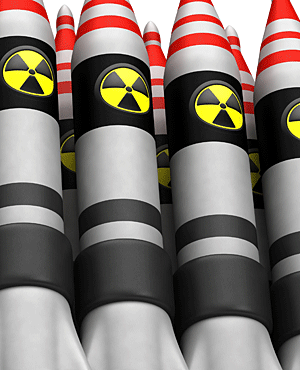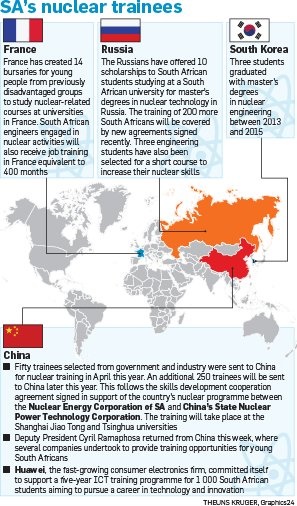
Johannesburg - Multinationals competing in South Africa for lucrative contracts are sweetening the deal with comprehensive technology transfer arrangements.
Technology and skills transfer have become crucial bargaining chips for corporations when competing for government tenders.
Now a whole generation of engineers and scientists are benefiting from the intentions of international firms to show that they are serious about transferring skills in crucial industries to the South African economy.
The nuclear agreement signed two weeks ago with Russian nuclear firm Rosatom is just the latest example.
Russia offered 10 new scholarships for master’s degree programmes in nuclear technology and agreed to train and develop 200 South African candidates at Russian universities and educational institutions.
Russia will train five categories of specialists for South Africa: nuclear power plant personnel, engineering and construction personnel, and specialists for the non-energy sector and nuclear infrastructure to study at nuclear power industry universities.
Russia is not the only country offering South Africans training in the nuclear industry as they compete for what will in all likelihood be the most expensive procurement programme in South Africa’s history.
The skills transfer agreements come against the background of Manpower SA’s 10th annual Talent Shortage Survey, which showed that 30% of South African employers cited the lack of industry-specific qualifications or certifications in terms of skilled trades as a challenge.
Specifically, technology skills were cited as inadequate for what was needed in South Africa.
The department of energy’s nuclear energy deputy director-general, Zizamele Mbambo, said a number of South Africans were now involved in skills development and training, with different vendors vying for the nuclear contract.
Earlier this year, South Africa sent 50 people to China for training in nuclear power-plant operations to prepare for the imminent procurement of the nuclear build programme.
The trainees were selected from the “major role players” in the industry and training will be in the form of lectures and tours to some of China’s nuclear facilities, said the department.
“This training opportunity marks the first phase of a scope that aims to cover capability and technology in areas of nuclear power plant engineering, procurement, manufacturing, construction, commissioning, operation and maintenance, and project management,” said the department.
South Korea also has an existing programme to train South African students for master’s degrees in nuclear engineering. Three students have graduated so far.
France offered 14 bursaries for young people from disadvantaged groups to study engineering. South African nuclear engineers will also get to work in France at the French corporation, Areva.
The SA Nuclear Energy Corporation also signed a memorandum of understanding with Électricité de France, a French electric utility company that is largely owned by the French government, regarding skills development. The agreement could result in the establishment of a nuclear campus in South Africa, added the department.
This week, the Chinese government agreed to help South Africa advance its industrialisation programme by also delivering skills transfer programmes.
The Chinese Academy of Governance has agreed to a placement of South African government officials and business leaders on a training and skills development programme.
Chinese firm Huawei will also support a five-year information and communications technology training programme for 1 000 South African students who want to pursue a career in technology and innovation.
One of the most recent skills transfer programmes involved in a significant tender was when engineers were trained by Gibela Rail Transport Consortium earlier this year for its R51 billion, 20-year project to build and supply the Passenger Rail Agency of SA with 600 modern passenger trains. Gibela is 61% owned by French-based Alstom. A total of R797 million had been budgeted for skills development as part of the project.
A number of engineers, drawn from a variety of industries, were sent to France to train at Alstom.
One of the engineers said: “I’m starting to understand the different dynamics of different trains. We will be designing trains for South African tracks with their specific gauges and curves. We are learning how to design from the requirements of the user – the passenger.
“You don’t just build a train and hope the passenger will slot in. We will be building for South Africans in South Africa. And when we start building trains for other African countries, they will be designed with those people’s specific needs in mind.”
Rosatom believes that training of the locals will drive South Africa’s nuclear future. It already has a memorandum of understanding in place with North-West University.
During a visit by Rosatom to the university, nuclear engineering programme manager Anthonie Cilliers said South Africa had a small but internationally respected group of nuclear scientists and engineering experts. But that significant collaboration with international nuclear nations, including Russia, the US, South Korea, China, France and Spain, is strengthening our expertise.
“Our strong links to international centres of nuclear research and excellence and our close collaboration with the International Atomic Energy Agency provide a good grounding for young people entering the nuclear industry and for South African industries,” said Cilliers.
The first batch of future engineers to benefit from Rosatom’s initiative are three students who won the Rosatom and North-West University’s competition for nuclear engineers. Students had to develop a plan to deal with the country’s current energy deficit and the development of a future nuclear industry.
A spokesperson for Rosatom said the Russian corporation had started helping out partner countries in 2010.
“The aim of the project is to help Rosatom’s partners to create a complex personnel training system for the country’s nuclear power industry.”
By the end of last year, there were 709 foreign students studying in Russian universities from 11 countries. According to the spokesperson, more than 300 new students from 36 countries were scheduled to study in Russia this year. By the end of next year, this number will increase to 1 400 foreign students




 Publications
Publications
 Partners
Partners









